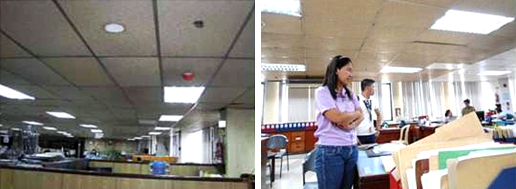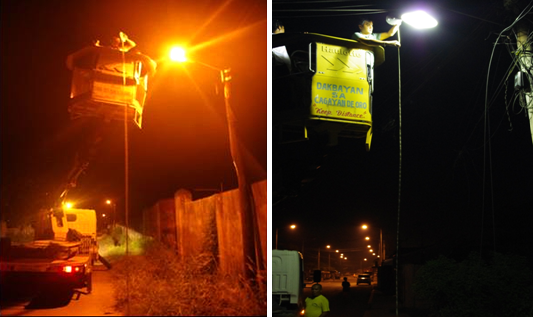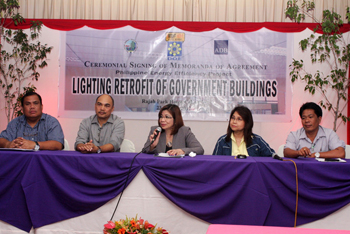| |
 |
| Newsletter of the International Institute for Energy Conservation (IIEC) |
September 2012 |
|
| |
| |
|
Philippine Energy Efficiency Project Surpasses Energy Savings Goal
 The Philippine Energy Efficiency Project (PEEP) was established by the Philippine Government and is being implemented by the Philippine Department of Energy (DOE) with support from Asian Development Bank and IIEC. The project, with a total approved budget of 46.5 million US dollars, covers a series of activities with the aim of reducing electricity consumption in the residential and public sectors, reducing the peak load power demand, reducing health risk associated with residual mercury and kerosene (in off-grid areas) and establishing a certification process for energy efficient and green commercial buildings. As of August 2012, the PEEP project team has successfully completed the implementation of the following activities: The Philippine Energy Efficiency Project (PEEP) was established by the Philippine Government and is being implemented by the Philippine Department of Energy (DOE) with support from Asian Development Bank and IIEC. The project, with a total approved budget of 46.5 million US dollars, covers a series of activities with the aim of reducing electricity consumption in the residential and public sectors, reducing the peak load power demand, reducing health risk associated with residual mercury and kerosene (in off-grid areas) and establishing a certification process for energy efficient and green commercial buildings. As of August 2012, the PEEP project team has successfully completed the implementation of the following activities: |
|
Nationwide distribution of 5 million Compact Fluorescent Lamps (CFLs) which translates to an estimated energy savings of 44.7 kWh per incandescent bulb (IB) replaced1
and annual energy savings of 223.56 GWh. |
| Retrofitting of 35 government buildings in Metro Manila: Installation of T5 14W lighting systems in 2,718 luminaires with 5,994 lamps and T5 28W lighting systems in 39,148 luminaires with 57,533 lamps. Measurement and verifications conducted indicate power demand reduction of 635 kW resulting in an annual energy saving of 1.37 GWh. |

 Retrofitting of 35 government buildings in Metro Manila Retrofitting of 35 government buildings in Metro Manila |
| Retrofitting of park lights in Baguio City: Replacement of 150W mercury vapor lamps with 70W high pressure sodium vapor lamps and the replacement of 358W decorative lamps with 15W bollard type compact fluorescent lamps. This resulted in a total power load reduction of 61.94 kW and total annual energy saving of 269.28 MWh. |

 Retrofitting of park lights in Baguio City Retrofitting of park lights in Baguio City |
|
Retrofitting of streetlights and traffic lights in Cagayan de Oro City: Retrofit of 2008 mercury vapour lamps ranging from 70 Watts – 500 Watts, with 70 Watts – 150 Watts High Pressure Sodium Lamps in the streetlights of 27 barangays. The project team also replaced traffic and pedestrian lanes lights with Light-Emitting Diodes (LED) lamps in four major intersections in the City. The replacement included the installation of fixtures and necessary accessories and controls. Total power load reduction was of 182.86 kW which translates to annual energy saving of 779.28 MWh. |

 Retrofitting of streetlights and traffic lights in Cagayan de Oro City Retrofitting of streetlights and traffic lights in Cagayan de Oro City |
| Retrofitting of 159 traffic intersections with LED in Metro Manila. This resulted in a power load reduction of 566 kW and annual energy savings of 4.96 GWh. |
|
| As of August 2012, the PEEP has already reduced power load by 242 MW and total annual power consumption by 315 GWh. This is estimated to have reduced an annual equivalent carbon emission of 170,167 teCO2. During the forthcoming months, the PEEP project team will be distributing an additional 3.6 million CFLs which is expected to generate an additional annual energy savings of 82.78 GWh2. Furthermore, PEEP is now expanding the energy efficiency lighting retrofits to an additional 100 government buildings nationwide which including government owned hospitals, schools and office buildings. With regards to street lighting, additional LED lights will also be retrofitted in 1,484 luminaires within 2-4 kms from the Ninoy Aquino International Airport. |
| Based on the values presented above, the project will be exceeding its original goal of power reduction of 238 MW and annual energy savings of 313 GWh upon project completion.
|

 Signing of Memorandum of Agreement (MOA) with the Beneficiaries of the Signing of Memorandum of Agreement (MOA) with the Beneficiaries of the
Retrofitting of 100 Government Buildings |
1 Assumption: the 15W CFL distributed replaced a 50W Incandescent Bulbs (IBs) and IBs operate on average about 3.5 hours per day, 365 days per year.
2 14W CFLs will be distributed in the succeeding lot.
|
| For further information, please contact Angelica Dealino - adealino@iiec.org |
Back to Top  |
|
|
|
| |
|
Demand-Side Management Workshop at the Pacific Power
Association Conference
 The IIEC is the leading implementing agency for the Promoting Energy Efficiency in The Pacific - Phase 2 (PEEP2) project funded by the Asian Development Bank. This 3-year project covers the Cook Islands, Papua New Guinea, Samoa, Tonga and Vanuatu. The objective is to stimulate energy efficiency through demand-side energy efficiency improvements in the residential, commercial, and government sectors in each of the five countries. The IIEC is the leading implementing agency for the Promoting Energy Efficiency in The Pacific - Phase 2 (PEEP2) project funded by the Asian Development Bank. This 3-year project covers the Cook Islands, Papua New Guinea, Samoa, Tonga and Vanuatu. The objective is to stimulate energy efficiency through demand-side energy efficiency improvements in the residential, commercial, and government sectors in each of the five countries. |
| Under PEEP2, IIEC in partnership with the Pacific Power Association (PPA) conducted a one day Demand-Side Management (DSM) Workshop on the 17th July 2012. This workshop was part of the PPA’s 21st Annual Conference and the 6th Engineer’s Workshop, held in Port Vila, Vanuatu. The speakers covered DSM implementation experiences of relevance to the Pacific including International Best Practices and Case Studies, Compact Fluorescent Lamp Programs, Energy Efficient Street Lighting Programs, Standards & Labeling and Retrofit Programs in Public Buildings. The workshop was mainly attended by electric utility representatives and engineers from several Pacific Island Countries (PICs). Furthermore, IIEC also carried out a presentation to the CEO’s of 25 electric utilities in the Pacific region on international experiences of DSM and the opportunities for the PICs to improve their operations through DSM. |

 Demand-Side Management Workshop at the Pacific Power Association Conference in Vanuatu Demand-Side Management Workshop at the Pacific Power Association Conference in Vanuatu |
| |
|
|
| |
|
From Design to Action – Demand-Side Management and
Energy Efficiency in Lao PDR
|
 Electricite du Laos (EdL) is moving forward with their first ever nationwide energy efficient lighting program for the residential sector through which inefficient incandescent light bulbs will be replaced with high quality energy efficient Compact Fluorescent Lamps (CFLs). The residential energy efficient lighting program is a component of the Demand-Side Management/Energy Efficiency (DSM/EE) Phase II Project,funded by the World Bank. EdL is also planning to retrofit 50 large public sector buildings in Vientiane Capital with energy efficient lighting and air-conditioning technologies. Electricite du Laos (EdL) is moving forward with their first ever nationwide energy efficient lighting program for the residential sector through which inefficient incandescent light bulbs will be replaced with high quality energy efficient Compact Fluorescent Lamps (CFLs). The residential energy efficient lighting program is a component of the Demand-Side Management/Energy Efficiency (DSM/EE) Phase II Project,funded by the World Bank. EdL is also planning to retrofit 50 large public sector buildings in Vientiane Capital with energy efficient lighting and air-conditioning technologies. |
 |
|
|
The DSM/EE Project in Lao PDR aims to reduce domestic electricity consumptions and the primary targets include the public and residential sector. These savings also enable Lao PDR to generate more revenue from electricity exports to neighbouring countries. A conservative estimation shows that EdL could save more than 10 GWh annually through the implementation of the abovementioned DSM/EE activities. IIEC has played an active role in supporting EdL to design their DSM/EE activities and also provide technical assistance in bulk purchasing of CFLs and procurement of energy efficient equipment for public sector buildings. |
|
|
|
| |
|
Roadmap to Set-up State Clean Energy Funds
 IIEC was awarded a project by UK Foreign & Commonwealth Office (UK-FCO) to Develop a Roadmap to Create State Clean Energy Funds (SCEFs) collected through a Public Benefits Charge (PBC) levied on electricity bills...the first of its kind in India. After an initial workshop with several State Energy Regulatory Commissioners, IIEC has made substantial progress in the establishment of a PBC and an SCEF, including: IIEC was awarded a project by UK Foreign & Commonwealth Office (UK-FCO) to Develop a Roadmap to Create State Clean Energy Funds (SCEFs) collected through a Public Benefits Charge (PBC) levied on electricity bills...the first of its kind in India. After an initial workshop with several State Energy Regulatory Commissioners, IIEC has made substantial progress in the establishment of a PBC and an SCEF, including: |
| A design document consisting of key findings and conclusions was developed and submitted to Karnataka Electricity Regulatory Commission (KERC). |
| Draft regulations and a discussion paper were developed that included legal sections of the Electricity Act applicable to set up such a fund, fund management and structure of the fund, the typology of the projects that would be funded by the SCEF. |
| KERC is now in the process of submitting the above documents for public consultation. |
| The next steps in the project include developing a road map document for establishing the SCEF and to launch solicitations for public private partnership. |
|
| For further information, please contact Nitin Pandit - npandit@iiec.org |
Back to Top  |
|
|
|
| |
|
Market Characterization for LEDs in India
 Bridgelux Inc., a Light-Emitting Diode (LED) manufacturer, contracted IIEC to carry out a market assessment of LED projects in India. The IIEC expert team analysed fifty five past and present LED projects in India to understand which sector has the highest potential for LEDs. Furthermore, import data analysis for the last year indicated a trend as to which categories of LED products were the most imported and also which Indian ports received the largest amount of LED products. IIEC also analysed and documented Indian standards for LEDs and developed a comprehensive database of LED manufacturers and vendors in India. The above information and lessons learned from these LED projects will be utilized to develop a strategic guide for large scale LED programs under competitive tenders. Bridgelux Inc., a Light-Emitting Diode (LED) manufacturer, contracted IIEC to carry out a market assessment of LED projects in India. The IIEC expert team analysed fifty five past and present LED projects in India to understand which sector has the highest potential for LEDs. Furthermore, import data analysis for the last year indicated a trend as to which categories of LED products were the most imported and also which Indian ports received the largest amount of LED products. IIEC also analysed and documented Indian standards for LEDs and developed a comprehensive database of LED manufacturers and vendors in India. The above information and lessons learned from these LED projects will be utilized to develop a strategic guide for large scale LED programs under competitive tenders. |
| For further information, please contact Nitin Pandit - npandit@iiec.org |
Back to Top  |
|
|
|
| |
|
| |
| |
About IIEC
 The International Institute for Energy Conservation (IIEC) was established in 1984 as a non-governmental (NGO), not-for-profit organization, in order to foster the implementation of energy efficiency in developing countries and countries in transition. IIEC’s mission is to accelerate the global adoption of energy efficiency, transport and environmental policies, technologies and best practices to enable sustainable economic and environmental development. The International Institute for Energy Conservation (IIEC) was established in 1984 as a non-governmental (NGO), not-for-profit organization, in order to foster the implementation of energy efficiency in developing countries and countries in transition. IIEC’s mission is to accelerate the global adoption of energy efficiency, transport and environmental policies, technologies and best practices to enable sustainable economic and environmental development. |
| For the past 25 years, IIEC has been providing solutions to the problems posed by the rapid increase of energy demand in developing and industrializing countries. IIEC has an established niche as a provider of novel solutions with the flexibility to work simultaneously with multilateral institutions, governments, academic and research institutes, industry and non-governmental organizations. |
|
 If you do not wish to receive IIEC E-Notes, please reply to e-notes@iiec.org with the word "UNSUBSCRIBE" in the subject line. If you do not wish to receive IIEC E-Notes, please reply to e-notes@iiec.org with the word "UNSUBSCRIBE" in the subject line. |
| |
 |
Partners for Sustainable Energy and Environmental Solutions  |
|
|
 |
| Head Office : |
 |
Asia Regional Office : |
Country Offices : |
|
USA
Tel: +1 703 281 7263
Fax: +1 703 938 5153
e-mail: iiecdc@iiec.org |
Thailand
Tel: +66 2 662 3460-4
Fax: +66 2 261 8615
e-mail: iiecbangkok@iiec.org |
India
Tel: +91 20 6410 2557-58
e-mail: iiecindia@iiec.org |
Philippines
Tel: +632 426 8567/426 6001 loc 4833
Fax: +632 426 8566
e-mail: iiecmanila@iiec.org |
|
 |
| Copyright © 2012 International Institute for Energy Conservation, All Rights Reserved. |
|
